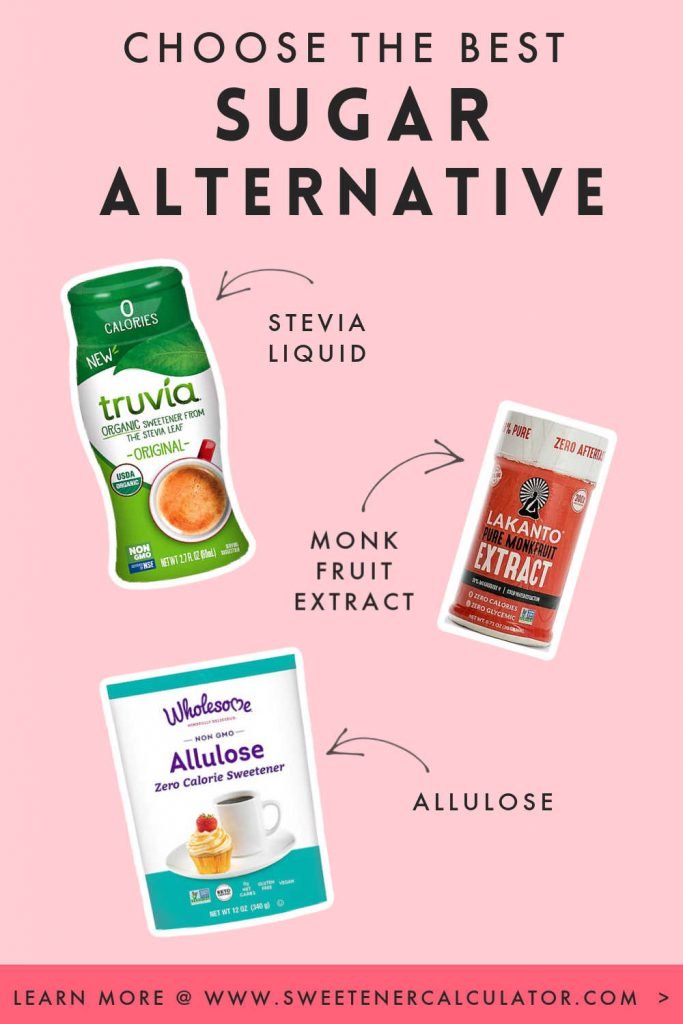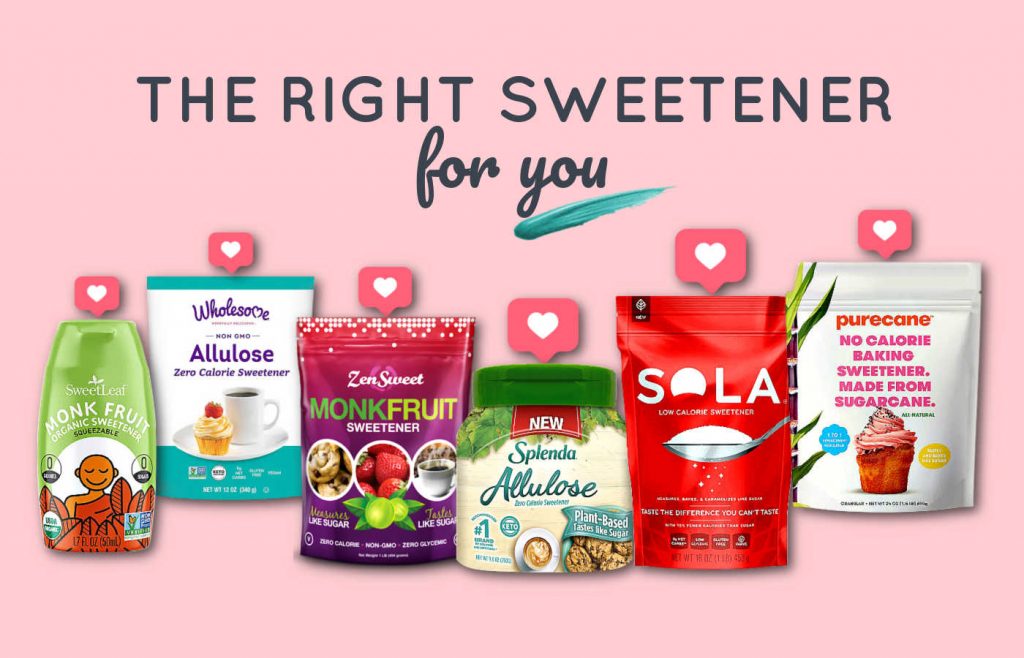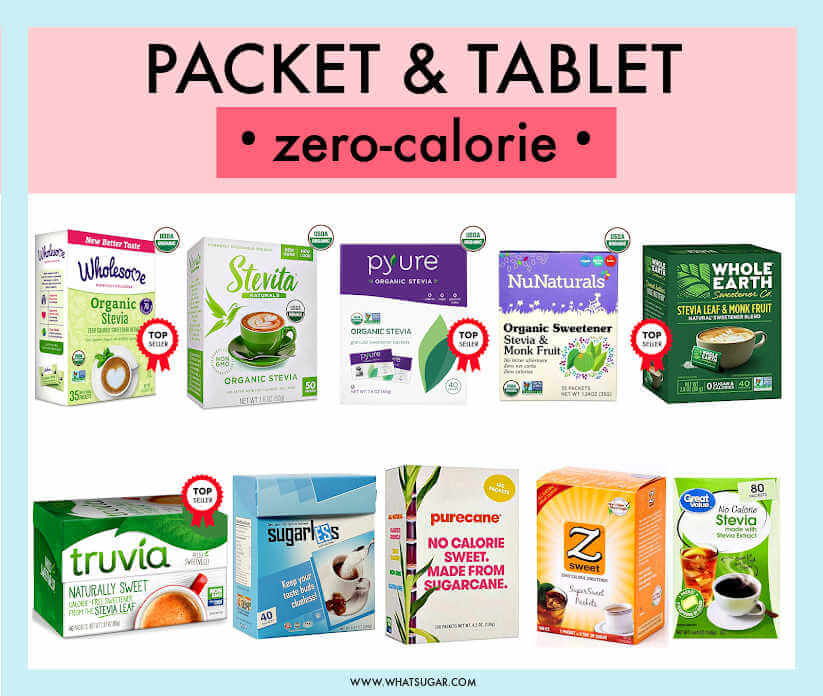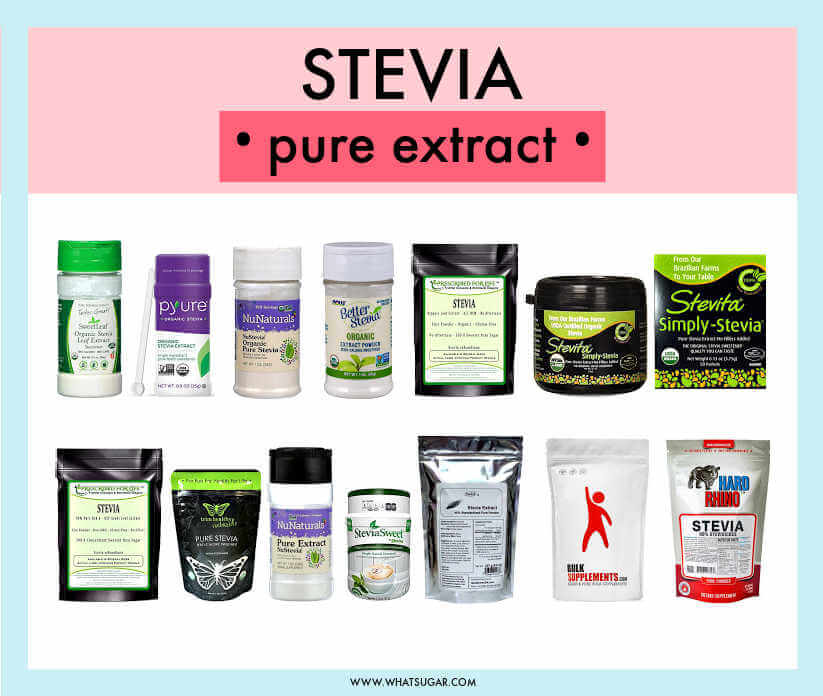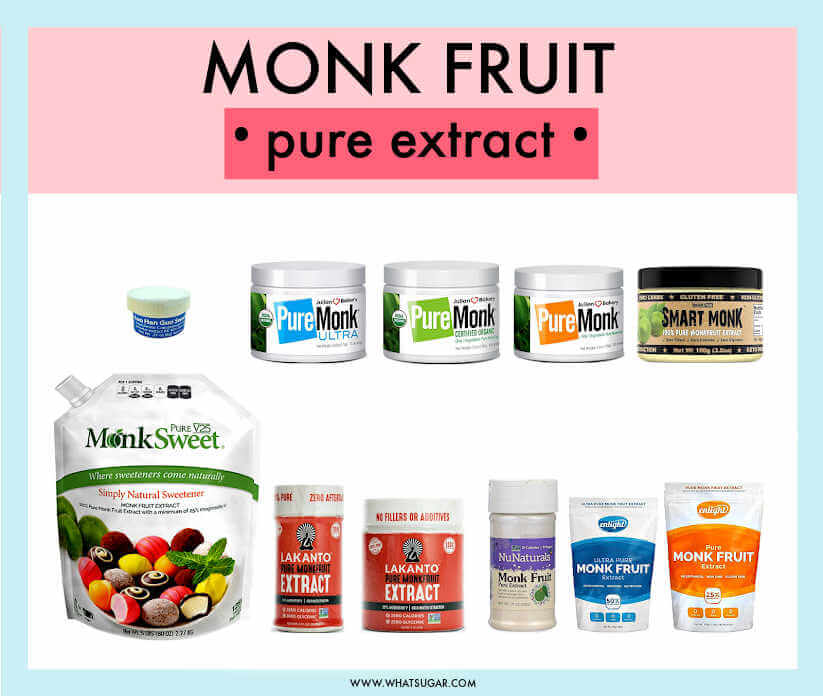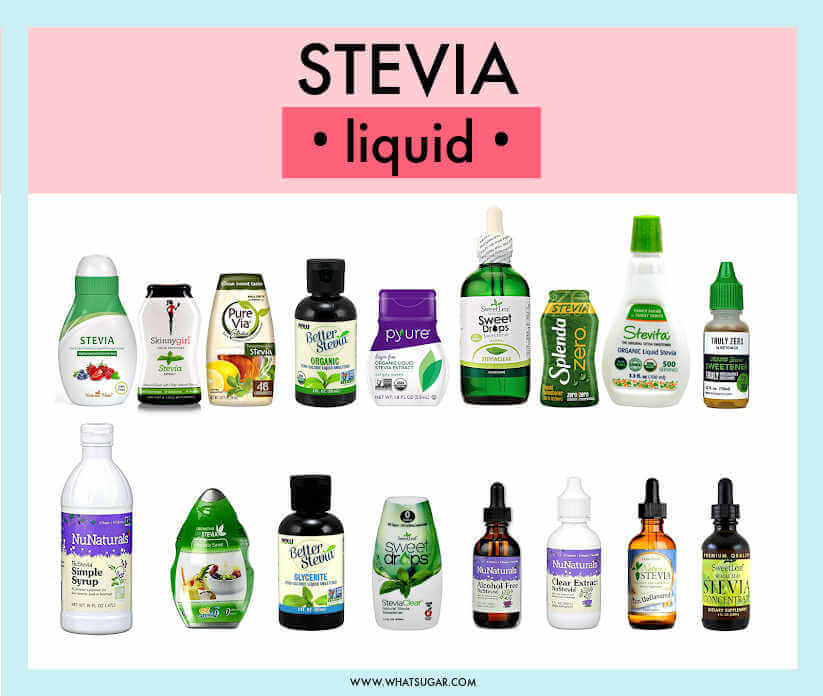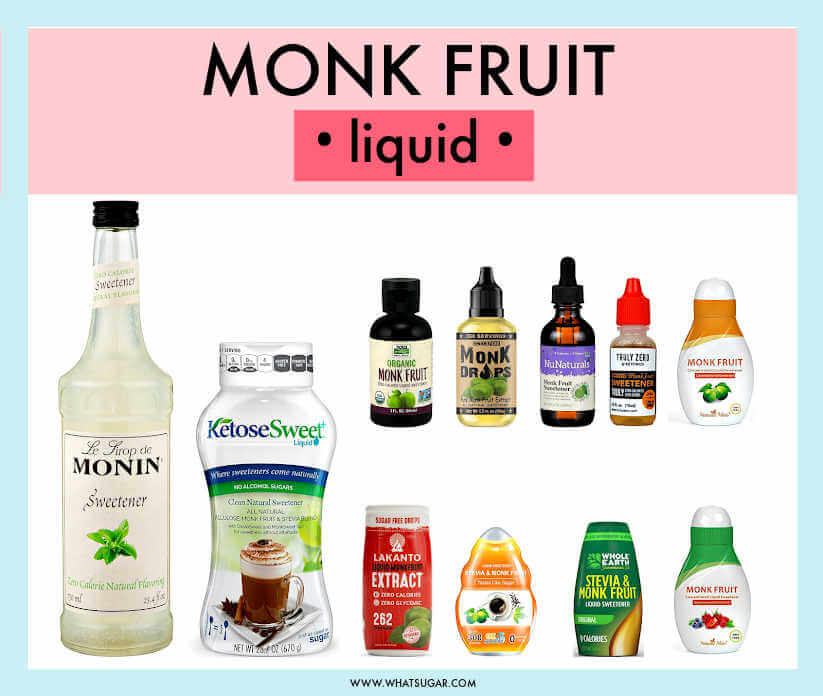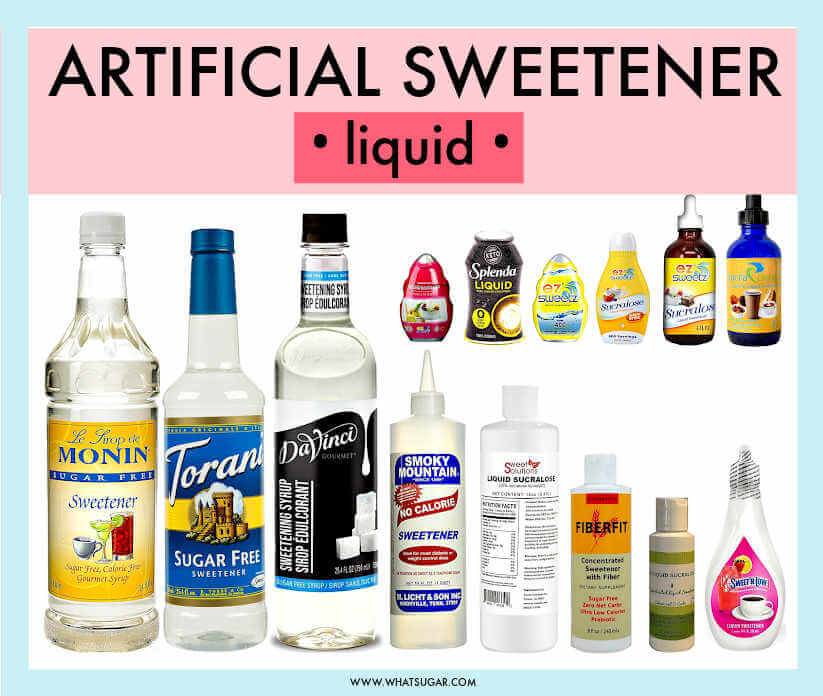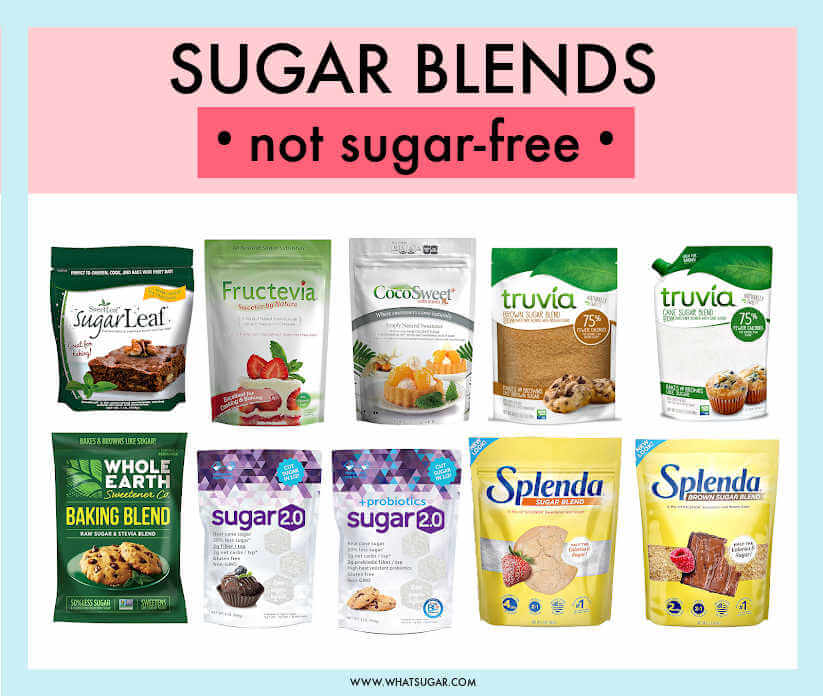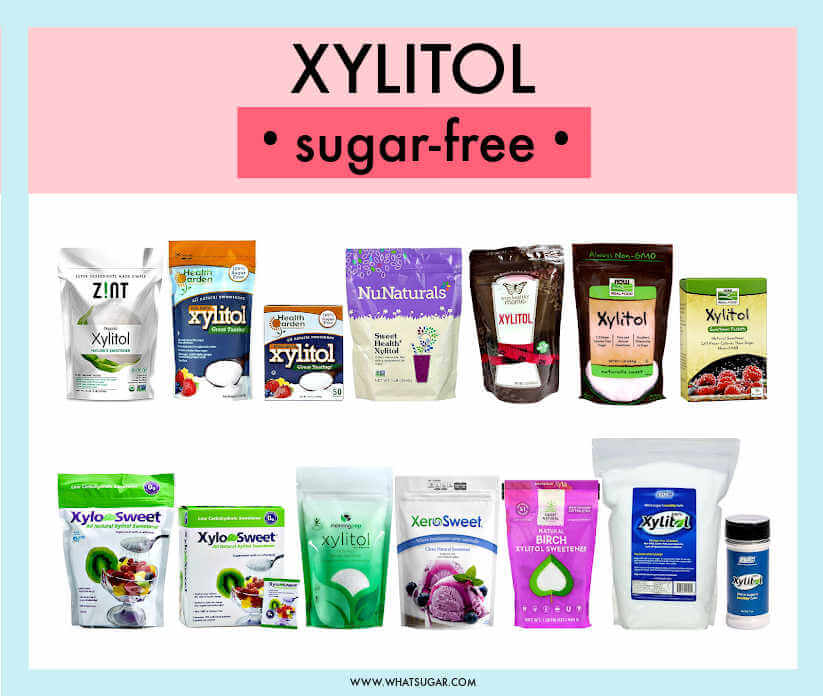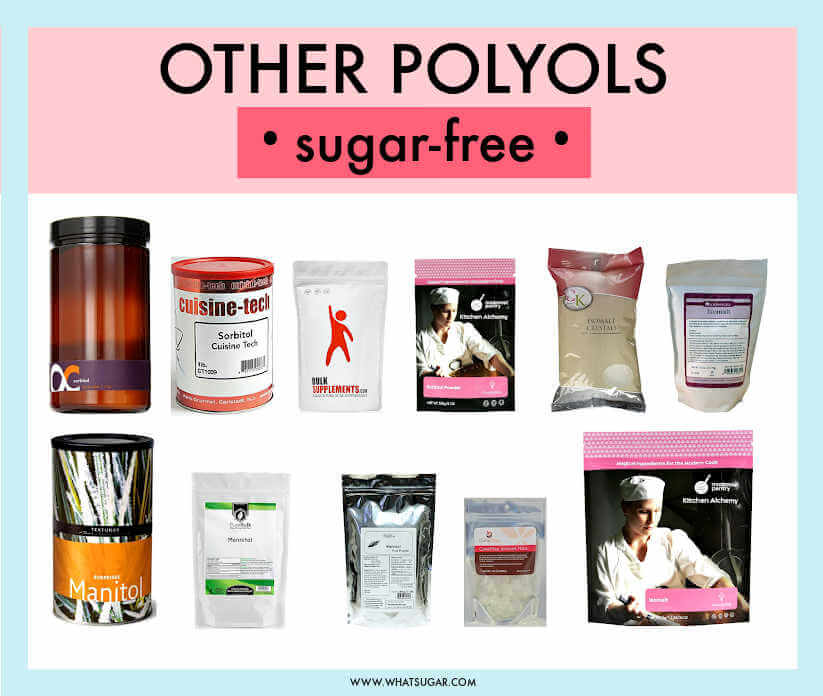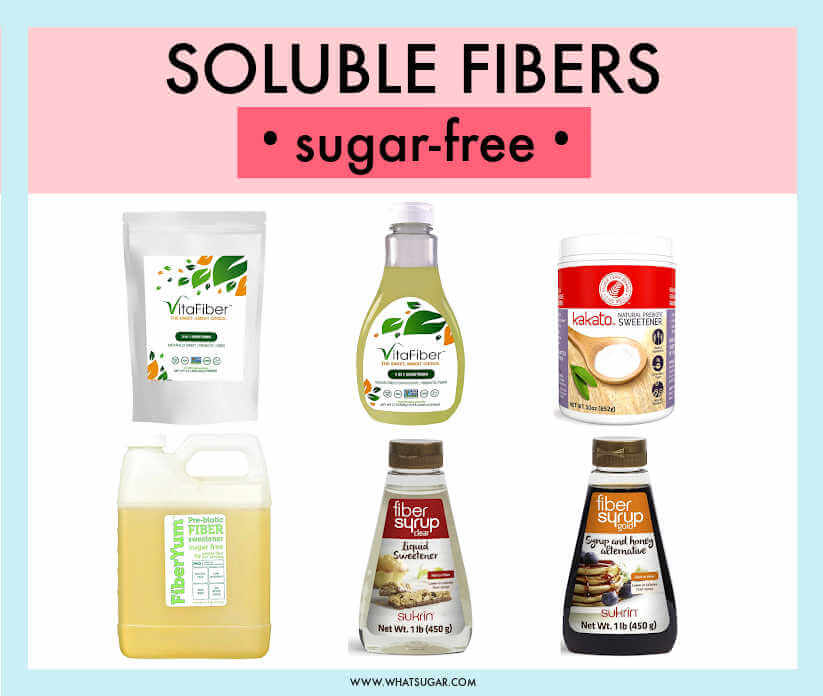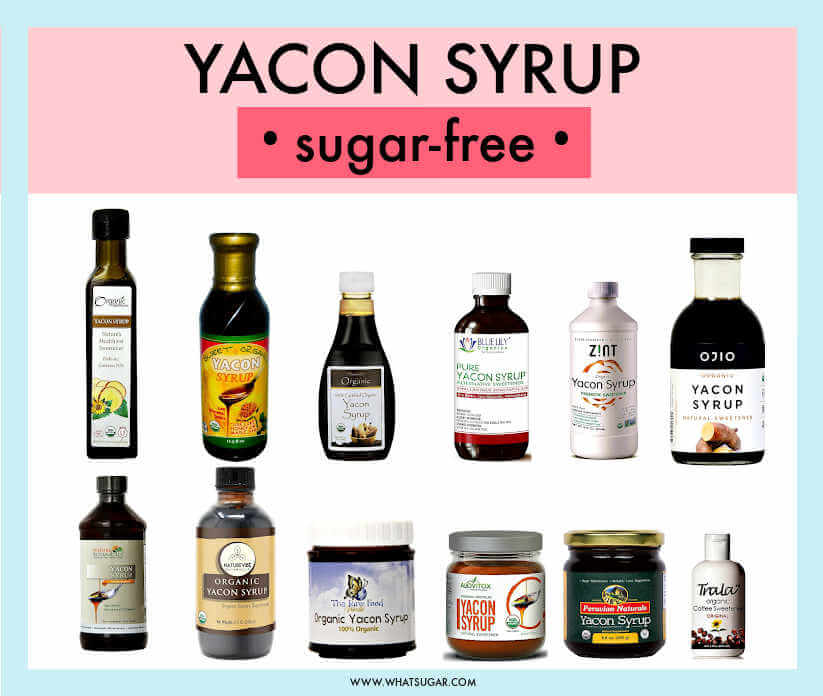Feeling overwhelmed trying to find the best and healthiest sugar alternative for your coffee, cooking and baking needs? Here is a handy chart that will take the guesswork away!
Tell me if this sounds like you.
With a familiar pang of guilt, you have settled your mind. Trying to give up on sweets clearly worked only as a short-term solution. You have a sweet tooth and can’t go a day without a slice or bite of something sweet.
You’ve been trying to reach for apples instead of chocolate and are willing to give up on sugar, but one thing you know for sure.
Sweetness has to stay!
For most of us, this important piece of eating healthy tends to feel so difficult.
Confused and overwhelmed by all the sweeteners in stores?
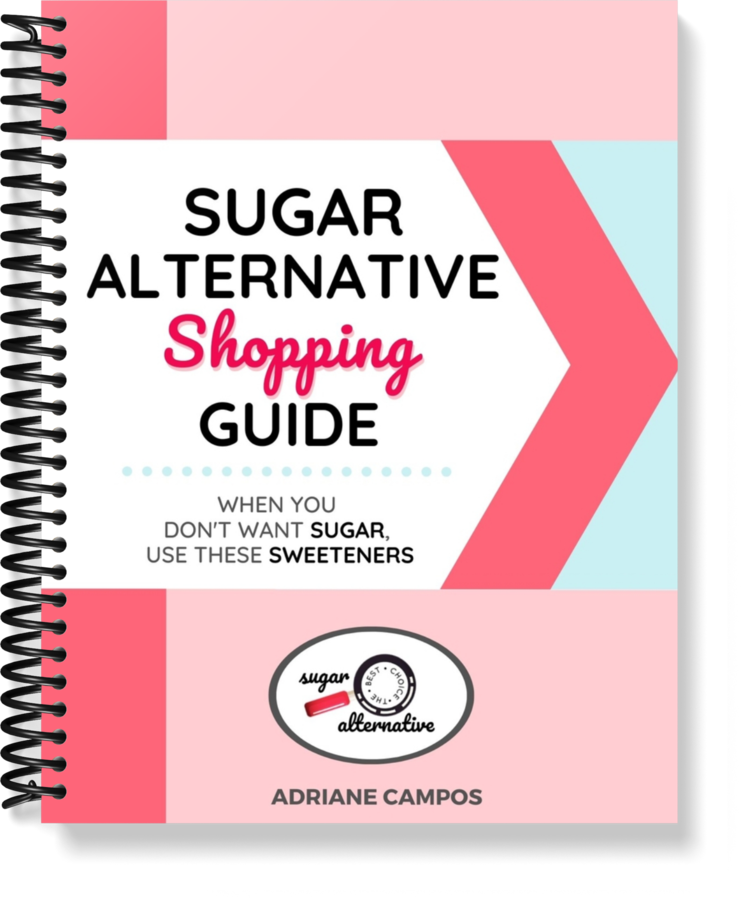 With 1000s of products sold in stores, our Sugar Alternative Shopping Guide will help you make sense of ALL the different options. It’s a goldmine—get it free for a limited time!
With 1000s of products sold in stores, our Sugar Alternative Shopping Guide will help you make sense of ALL the different options. It’s a goldmine—get it free for a limited time!
How to start venturing into the sugar alternative world? What is the best replacement for sugar? What is the healthiest sweetener?
Even as a sweetener enthusiast, my mind spins with the huge number of sweeteners in stores. This post is a result of hours thinking about how I could help you find the best sugar alternative. I started by sorting hundreds of brands and products based on their ingredients and hope to give you a digestible guide…
One spoonful at a time.
Instead of walking up and down grocery store aisles confused by shelves full of options, let me take the guesswork away. I know that choosing the best sugar alternative can seem like a wearing labyrinth of options and dead ends. But it doesn’t have to be. My tried-and-true chart will help you out!
Is the best sweetener for me, the best one for you?
I’m often asked, “What’s the best and healthiest sweetener?” The answer is complicated because the definition of “best” and “healthy” varies from person to person. The best one FOR ME might not be the one FOR YOU at all. It all depends on personal priorities and concerns, as you can see below:
• Mary’s best sweetener is a natural, minimally processed sugar, such as honey and maple syrup
• Jack is trying to lose and maintain weight; the best sweetener for him is sugar-free or zero-calories
• Jill’s husband has diabetes, so she’s looking for the best sweetener that won’t spike his blood sugar
• Liz is an amazing baker; the best sweetener for her is good old, foolproof white refined sugar.
Choosing which sweetener to use is a matter of preference.
Which sweetener is best suited for your needs?
To find the right sweetener, you need to figure out what is essential TO YOU.
Do calories matter?
Do you want to follow a specific diet, such as keto or low-calorie, and need a sugar-free and zero-calorie sweetener?
Maybe your approach is to start with moderation – not a complete break away from sugar. You want to reduce calories and sugar in your recipes but don’t need it to be sugar-free. Adjusting your palate to get used to not-so-sweet treats could be what you’ll try in the first place.
Or, you might have a family member with health issues, such as diabetes or irritable bowel syndrome (IBS).
Are you baking or just sweetening your coffee? Are you looking for a sweetener that measures just like table sugar, i.e., a cup-for-cup sugar replacement?
To help you in the decision-making process, I built a yes/no flowchart with simple questions that will lead you to the right sweeteners.
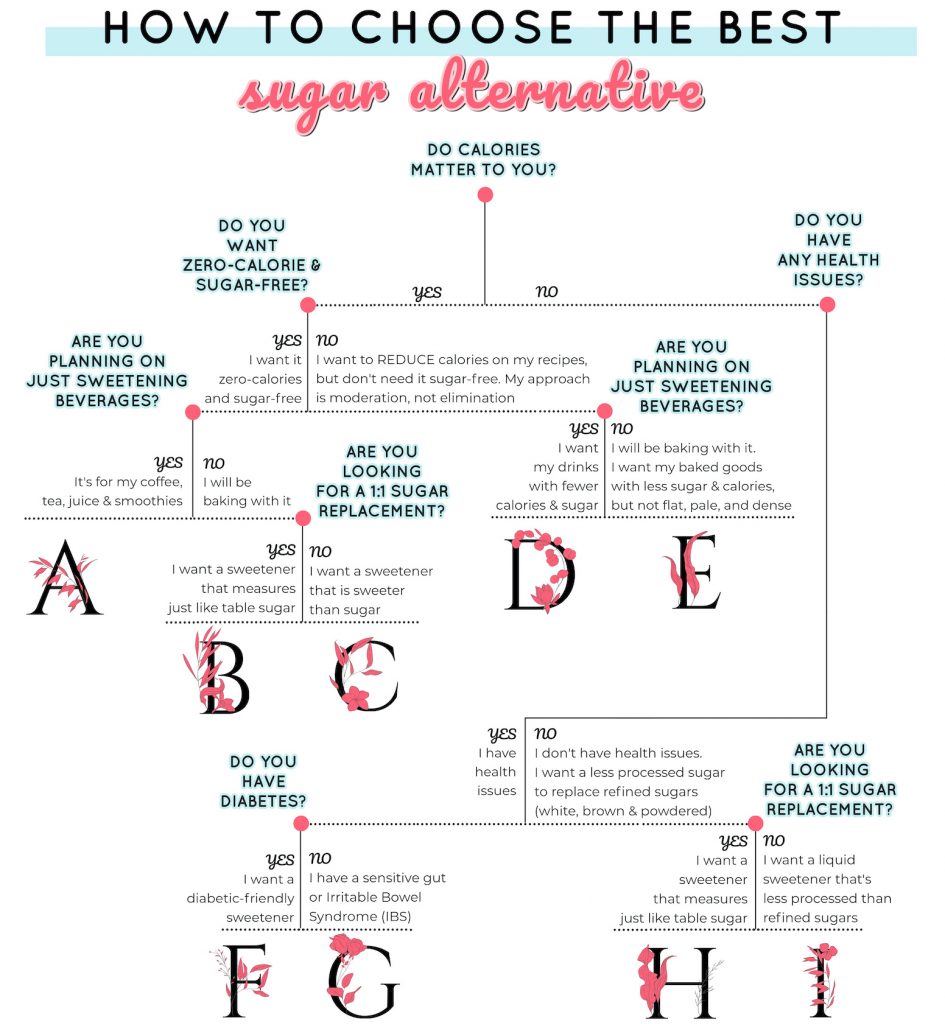
5 Steps to Find the Right Sweetener
Step 1: To figure out what a sweetener needs to accomplish for YOUR needs, read questions on the “How to Choose the Right Sweetener” chart above. Keep answering YES or NO until you reach a letter— from A to I.
Step 2: Move on to the “List of The Best and Worst Sweeteners to Buy” ahead on this post and search for your resulting letter (from A to I). You’ll find the most frequently asked questions (FAQ) related to that group of sweeteners and then the type of products currently sold in stores that fits your needs.
Step 3: Click on the “>>>” OR the gallery of images to be linked to a new page with infographics that compare similar products and brands side-by-side based on their ingredients. Choose two to three products. Pay attention to their front-of-the-package image and read the brand and type of sweetener.
Step 4: With the products you chose, enter them on this interactive tool I created called Sugar Swap Tool. Compare those sweeteners side by side based on their calories, sugar content, net carbs, and glycemic index. I recommend you compare them with table sugar or any other sweetener you know well. This tool will also give you those sweeteners complete list of ingredients and related products. Sweet!
Step 5: It’s important to keep in mind that there isn’t a one-size-fits-all type of sweetener. You can’t choose one sweetener for all your recipes and drinks that will give you all that table sugar has to offer. I recommend starting with three products — one to replace table sugar, a second to replace brown sugar, and a powdered sugar replacement.
List of The Best and Worst Sweeteners to Buy
The sweeteners listed below include products and brands sold in stores across the United States.
Click on the “>>>” or the image gallery to be linked to a new page. Once there, you’ll find sweeteners grouped together based on their ingredients.
As an example, let’s say you are looking for a natural zero-calorie sweetener for your coffee.
Here is what you’d do:
Step 1. From the “How to choose the right sweetener” chart, you get the letter “A”
Step 2. Scroll down to letter A; you can see that one of the FAQ is what you’re looking for
Step 3. Check out the list of the products OR the image gallery;
Let’s say you chose PURE stevia extracts, by clicking on a link, you’ll land on a new page;
Search for PURE stevia extracts infographic and select 2 or 3 products that resonate with your wallet
Step 4. Come back here to compare them side by side on the Sugar Swap Tool.
Step 5. Repeat steps 1 to 4 with other products on the “A” letter, if needed. Settle for 2 or 3 products.
To jump straight to your resulting letter, click here: A | B | C | D | E | F | G | H | I

The best zero-calorie, sugar-free sweetener for beverages
Frequently Asked Questions:
What is the best zero-calorie sweetener for coffee?
How can I sweeten my smoothies and cocktails without sugar?
What is the best low-calorie sugar substitute for tea?
If you are looking for a zero-calorie, sugar-free sweetener for your beverages (coffee, tea, juice, smoothies, cocktails), technically you can choose any of the products I list below:
For the complete list of the best natural sweetener for your drinks >>>
For the complete list of the best artificial sweetener for your drinks >>>
For a convenient way to sweeten your drinks on-the-go, you can choose individual packets or concentrated products, which are super sweet and just a couple of drops, a tiny pinch of powder, or a tablet will give you the same sweetness of a teaspoon of table sugar. Stick them in your purse and use them at the restaurant, they offer a quick and easy option for hot and cold beverages.
• Individual packets, cubes, tablets >>>
• Stevia (pure extract without fillers) >>>
• Monk fruit (pure extracts without fillers) >>>
• Liquid (natural sweeteners) >>>
• Liquid (artificial sweeteners) >>>
• Miracle fruit (for fun sweetening acidic drinks and foods) >>>
You can also explore your options by clicking on the links below:

The best zero-calorie, sugar-free 1:1 sugar replacement for baking
Frequently Asked Questions:
What is a cup-for-cup sweetener for baking?
Is there a sugar-free sweetener that measures like sugar?
What is the best spoon-for-spoon sweetener for keto?
When baking, the easiest way to replace sugar is with a one-to-one sugar substitute.
Exchange some (or all) sugar in your recipe with an equal volume (not weight) of the alternative. It’s nice because you don’t have to look for a conversion chart when using those products. One teaspoon of those sweeteners equals one teaspoon of table sugar. One cup has the same sweetness as 1 cup of sugar and so on.
What convenience!
Find the complete list of 1:1 sugar replacements for your baking needs here >>>
You can also explore your options by clicking on the links below:

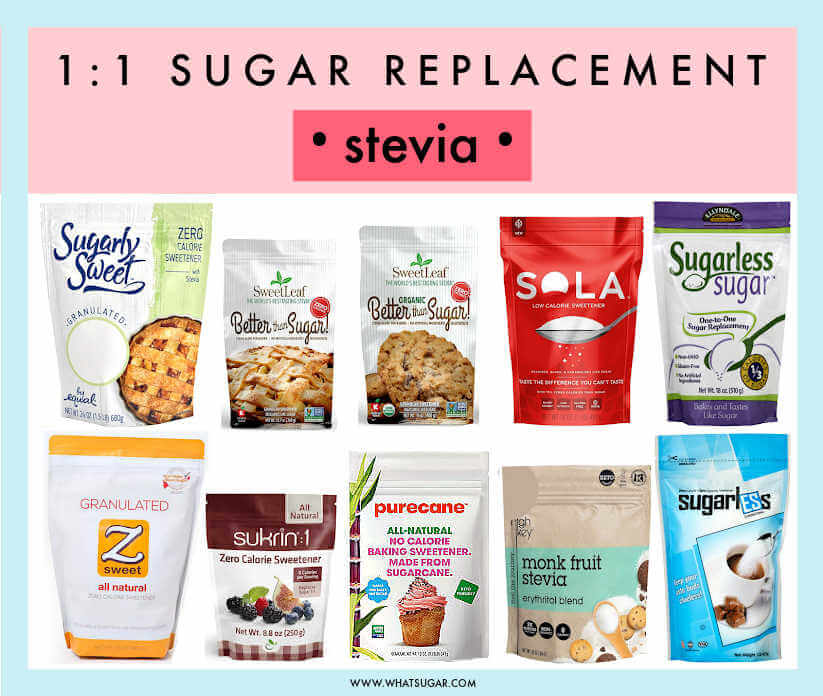
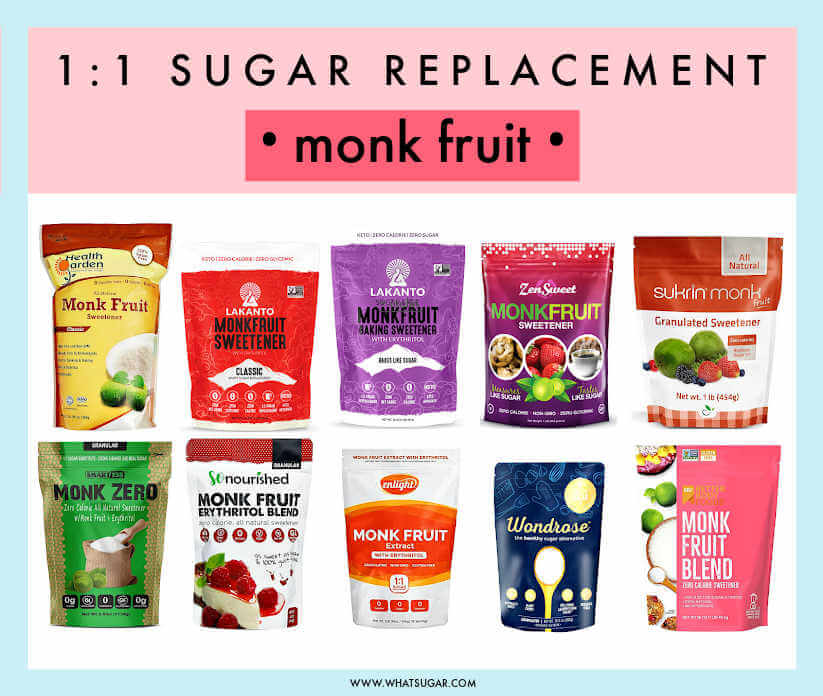
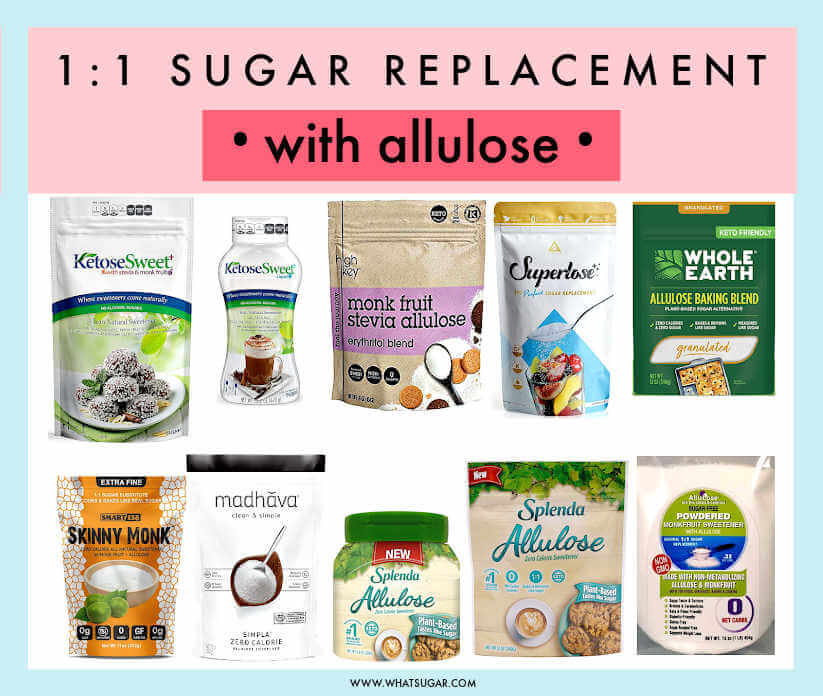
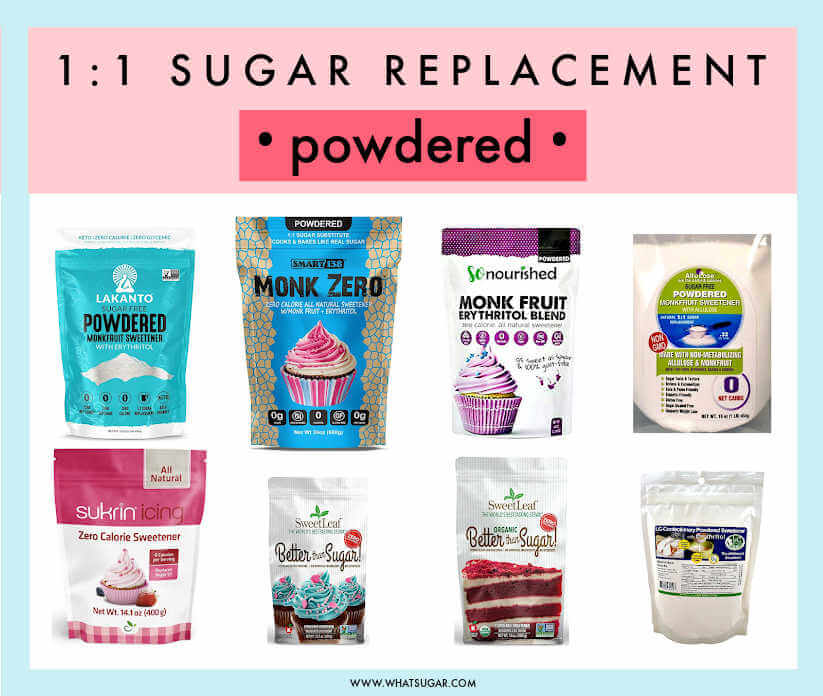
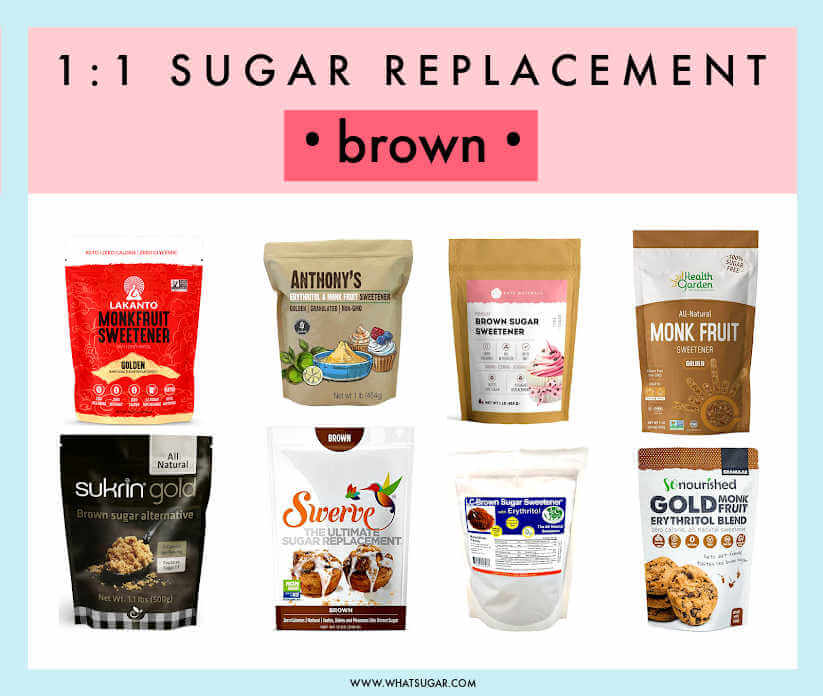

The best and worst concentrated zero-calorie, sugar-free sweetener for baking
Frequently Asked Questions:
What is the best baking sweetener for keto?
Can I substitute sugar-free sweeteners for sugar in baking?
What sweetener should I use on keto?
The BEST sweetener for baking
I list below sugar-free, zero-calorie sweeteners for baking, which are 1.5 to 12 times sweeter than sugar. When using them, you need to add less than you would with table sugar. To find out the right amount to measure, use my Sweetener Calculator.
• Stevia with fillers (NOT pure extracts, liquids, tablets) >>>
• Monk fruit with fillers (NOT pure extracts, liquids, cubes) >>>
• Erythritol with fillers (NOT liquids, cubes, tablets) >>>
• Artificial sweeteners (NOT liquids, pure sucralose, pure aspartame, tablets) >>>
The WORST sweetener for baking
If you are wondering, “What sweeteners should I not use when baking?” I list below the worst sweeteners to avoid shopping for sugar-free baking because they offer no bulk (weight and volume):
• Worst stevia for baking = pure extracts, liquids, cubes, tablets >>>
• Worst monk fruit for baking = pure extracts, liquids >>>
• Worst liquid zero-calorie sweeteners for baking = ALL of them >>>
You can also explore your options by clicking on the links below:
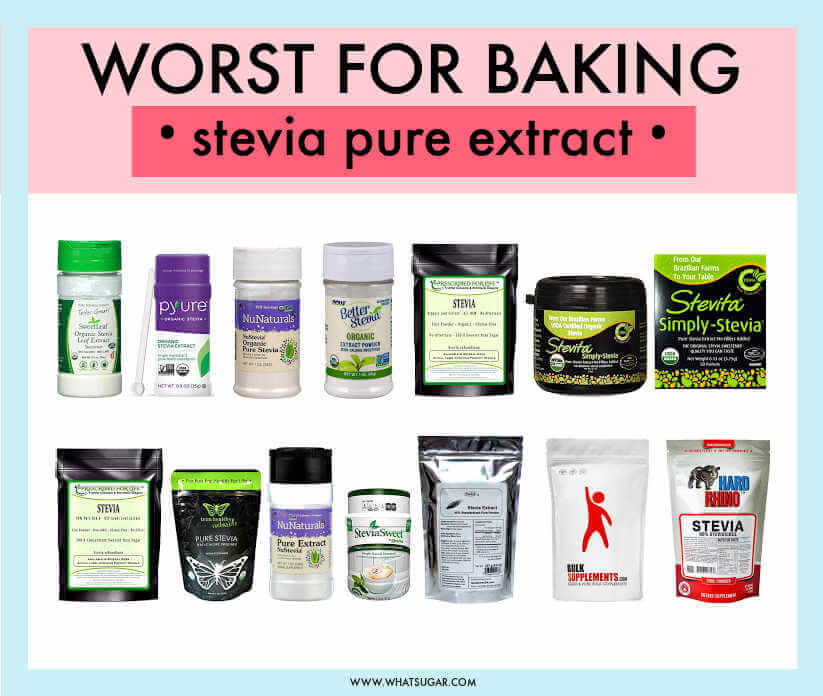
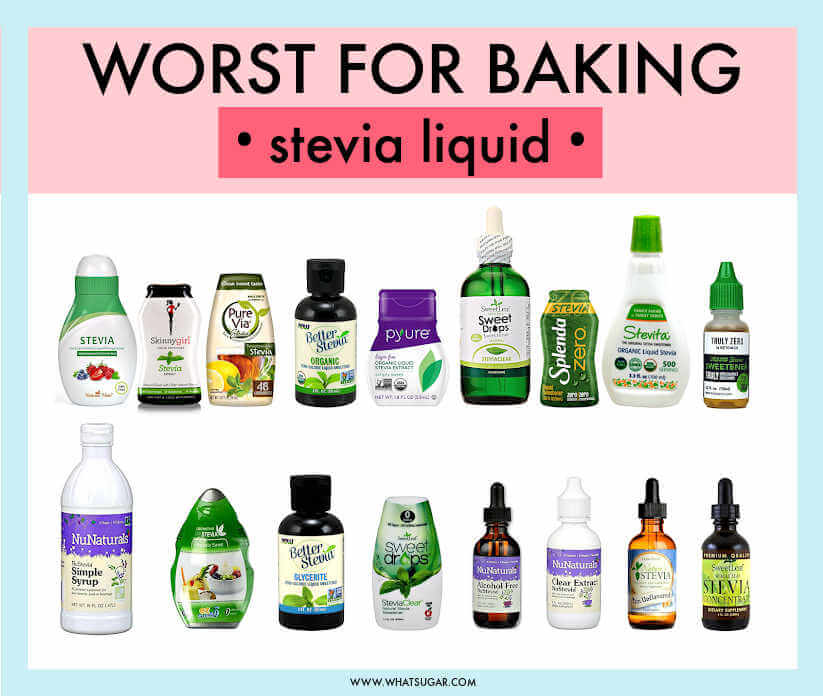

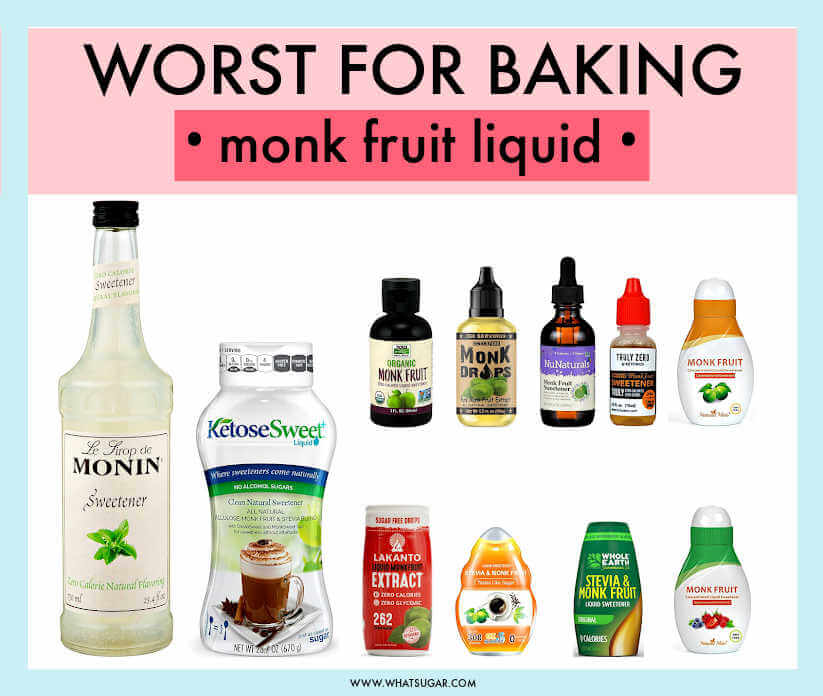
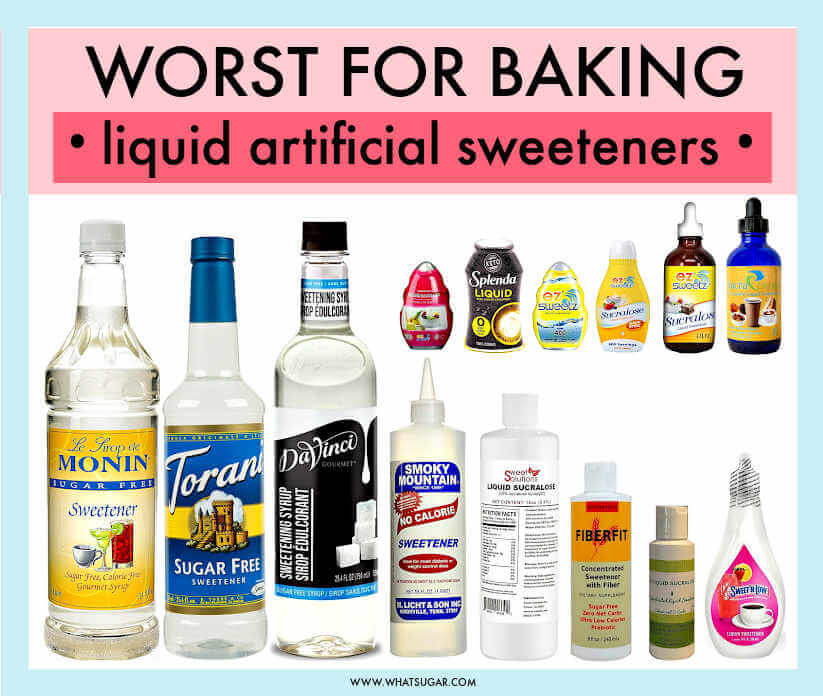


The best sweetener to reduce (not eliminate) sugar and calories in beverages
Frequently Asked Questions:
How do I reduce the amount of sugar in my coffee?
Is there a sweetener to help me cut back on sugar?
We all know that cutting out sugar cold turkey isn’t easy, and not even recommended.
The best way to reduce your sugar intake is by adjusting your palate to foods that are not super sweet. Choose where it might be easiest to modify. You can start cutting 10% of the sugar in your coffee, for example. Once you get accustomed, keep cutting back. You’ll find that you come to prefer less sweet coffee.
That’s the ultimate goal: gradually eat less sugar by training your palate.
With that said, if you want a sugar substitute to help you reduce (not eliminate) calories and sugar in your beverages, the following options are available in stores:
• “Sugar blends” = 25 to 75% fewer sugar & calories than sugar (not sugar-free) >>>
• Low-digestible sweeteners = 25 to 75% fewer calories than sugar (sugar-free) >>>
You can also explore your options by clicking on the links below:

The best sweetener for baking with 30 to 60% less calories
Frequently Asked Questions:
Is there a baking sweetener with half the calories of sugar?
Can I buy a baking sweetener with ½ the sugar?
If you want to bake with less sugar and calories, you can try to reduce up to a third of the sugar called for in the recipe without major problems.
Another option is choosing the sweeteners listed below.
The so-called “sugar blends” have a sugar (white, brown, or coconut sugar) combined with a high-intensity sweetener (stevia, monk fruit, sucralose). Some products are one-to-one sugar replacements. Others are sweeter than table sugar, which means you’ll need just half or 1/3 of the sweetener for each full cup of sugar specified in your recipe.
• “Sugar blends” = 25 to 75% fewer sugar & calories than sugar (not sugar-free) >>>
• Soluble fibers (avoid pure soluble fibers, such as IMO, for baking) >>>
You can also explore your options by clicking on the links below:

The best diabetic-friendly sweetener
Frequently Asked Questions:
What sweeteners do not raise your blood sugar?
Which sugar substitutes are best for diabetics?
What is the best low glycemic sweetener?
If you have diabetes and is looking for sweeteners that won’t spike your blood sugar level, explore the following sugar-free products:
• Zero-calorie sweeteners >>>
• Low-digestible sweeteners >>>
You might be thinking “Which sugar is lowest on the glycemic index?” Allulose has a glycemic index of zero and fructose 19. Check them out below:
• Allulose >>>
• Fructose >>>

The best and worst sweeteners for your stomach
Frequently Asked Questions:
Can sweeteners cause stomach upset and diarrhea?
What sugar alternatives cause gas?
What sugar substitutes are bad for IBS (irritable bowel syndrome)?
The WORST sweeteners for your stomach
The sweeteners below are often associated with digestive issues, such as bloating, stomach rumble, flatulence, diarrhea, and nausea.
If you suffer from irritable bowel syndrome (IBS), you should avoid the so-called FODMAP carbohydrates—an acronym for Fermentable Oligo-, Di-, Mono-saccharides, and Polyols. The sweeteners below contain FODMAPS.
They’re not the best sweeteners if your digestive system is sensitive, and you should stay away from them.
For the complete list of low-digestible sweeteners, go here >>>
To explore them individually:
• Erythritol (pure and blends) >>>
• Xylitol (pure and blends) >>>
• Sorbitol, mannitol, isomalt >>>
• Soluble fibers (yacon, inulin, FOS, IMO) >>>
• Allulose (pure and blends) >>>
• Low-Digestible Syrups (ONLY yacon, IMO, and blends) >>>
Some people might also be sensitive to fructose, so here are the fructose-based sweeteners to avoid:
• Fructevia >>>
• Monkose >>>
• Fructose >>>
You can also explore your options by clicking on the links below:
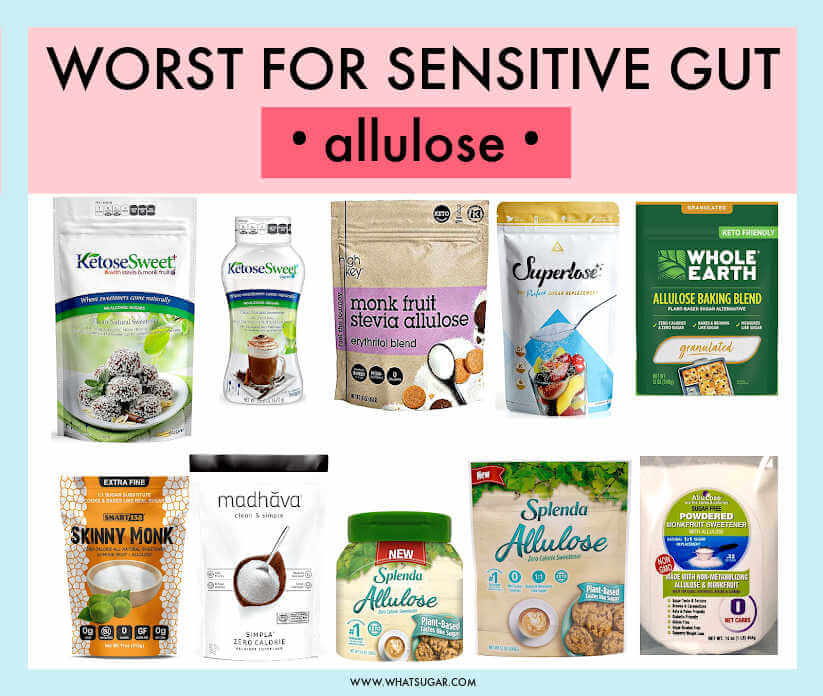

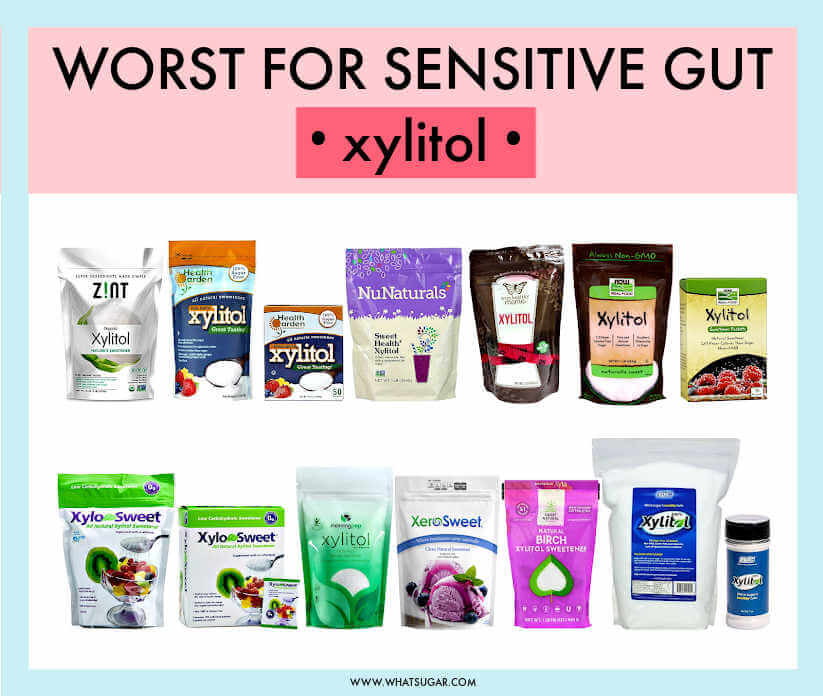
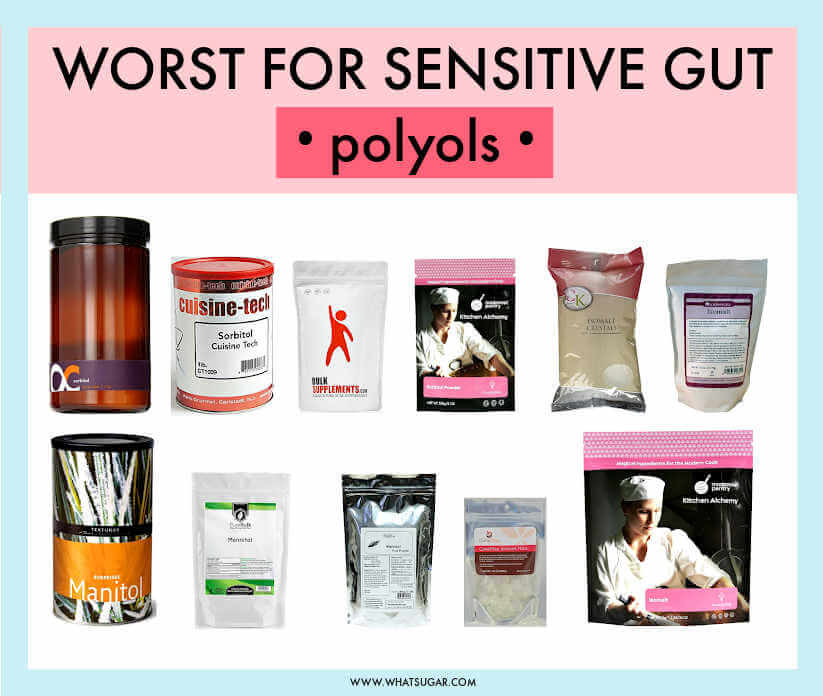

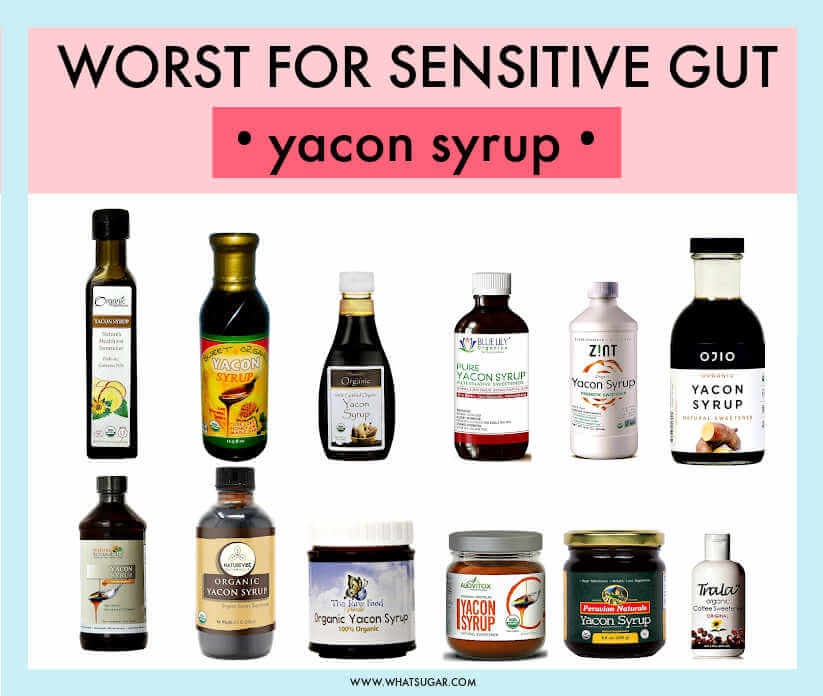
The BEST sweeteners for your stomach
For beverages, the best zero-calorie sweeteners that won’t upset your gut are:
• Stevia (ONLY the pure extracts) >>>
• Monk fruit (ONLY the pure extracts) >>>
• Liquid zero-calorie sweetener >>>
For baking, the best zero-calorie sweeteners that won’t upset your gut include:
• 1:1 sugar replacements (ONLY those with maltodextrin) >>>
• Stevia (ONLY those with sugars or maltodextrin) >>>
• Monk Fruit (ONLY those with glucose or maltodextrin) >>>
If you are not worried about calories, the best sweeteners that won’t upset your gut include:
• Refined Sugar >>>
• Raw sugars >>>
• Unrefined sugars >>>
• Sap- and nectar-derived sugars >>>
• Starch-derived sugars >>>
• Fruit-derived sweeteners >>>

The best less-processed sugars (only the dry ones)
Frequently Asked Questions:
Is unrefined sugar better than white sugar?
What is the healthiest sugar?
Are coconut sugar and muscovado healthier than regular sugar?
If you believe the best and healthiest sweetener is a natural, minimally processed sugar, the letter “H” is for you.
The sweeteners listed here are less processed than regular refined sugars, such as white, brown, and powdered. Less-processed sweeteners include dry sweeteners — coconut sugar, muscovado sugar, maple sugar — and syrups such as honey and maple syrup.
A warning here: My answers to the FAQs listed above may come as a surprise. Less-processed sweeteners are simple carbohydrates, just like refined sugars.
Chemically speaking, they’re all called “sugar.” The term sugar refers to simple carbohydrates and includes not only table sugar, but 80 other sweeteners in dry and liquid form — honey, agave, coconut syrup, Sucanat, maple sugar. They’re generally not too different from one another in terms of nutritional value.
The general formula for those sweeteners is SUGAR = SIMPLE CARBS (sucrose, fructose, glucose) + WATER.
So, here is my answer to the FAQs above. Sweeteners that are less processed than regular refined sugars are not “better for you” or healthier than table sugar. To find the “best” sugar, we should consider the unique taste, aroma, culinary role, and the satisfaction they offer — not their nutrition value.
With that said, if you’re not worried about calories and is looking for a less-processed sugar, refer to the list below. They are dry sweeteners that measure like regular white, brown, and powdered sugar.
• Raw sugars (*not the liquid ones) >>>
• Unrefined sugars (*not the liquid ones) >>>
• Sap- and nectar-derived sugars (*not the liquid ones) >>>
• Fruit-derived sweeteners (*not the liquid ones) >>>
*The sugars in liquid form are not always cup-for cup sugar replacements. For example, maple syrup replaces table sugar on a 1:1 ratio (in volume), but honey is 30% sweeter, so you need to use 1 1/3 cup for every cup of table sugar. To find out the correct amount to substitute, use my Sweetener Calculator.

The best less-processed syrups and nectars
Frequently Asked Questions:
What are the healthiest syrups?
What are the healthiest alternatives to pancake syrup?
Are maple syrup and honey a better alternative to sugar?
If you believe the best and healthiest sweetener is a natural, minimally processed sugar, such as honey and maple syrup, the letter “I” is for you.
They are for those of us not worried about calories.
The syrups listed below go through less refining and processing than regular refined sugars (white, brown, powdered). When substituting syrups for table sugar, keep in mind they contain different amounts of water. Therefore, you will need to adjust your recipe according to this post, and you can use my Sweetener Calculator to help you out.
Wondering if honey and maple syrup are healthier than sugar? Please read the “warning” on letter “G” above. Nutritionally speaking, less processed syrups (honey, maple syrup, date syrup) are not much different than regular refined sugars.
• Raw sugars in liquid form (organic molasses, liquid raw sugar) >>>
• Unrefined sugars in liquid form (traditional molasses) >>>
• Sap- and nectar-derived syrups (honey, agave, maple syrup, coconut nectar, sorghum molasses) >>>
• Starch-derived syrups (barley malt, brown rice, and sweet potato syrups) >>>
• Fruit-derived syrups and nectars >>>
What is the Best Tasting Sweetener?
If you are wondering, “what sugar substitute has the best taste?” or “which sugar alternative tastes the most like sugar?” here is what you need to know.
What I taste and what you taste is different.
The choice of sweetener with the best taste is not only subjective, but also influenced by genetic and anatomical variations. Different people experience sweeteners differently depending on factors particular to each of us, such as:
• age
• sex
• health
• education level
• income
• food preferences
• consumption habits
• environment or context in which we eat the sweetener.
We also have differences in our taste buds and saliva.
It’s all a matter of preference. Some people like the taste of monk fruit better than stevia. Others prefer sucralose.
For most of us, table sugar has the best taste. We tend to dislike sugar substitutes because they don’t match the sweetness profile of table sugar.
Besides, some of us are more worried about the “healthfulness” of a sweetener and tend to accept “off” tastes—bitter, metallic, cooling, or licorice-like—more than others.
“It’s impossible to choose the best-tasting sweetener that everyone will accept”
With that said, I’d recommend you sample as many sweeteners as possible until you find a version that resonates with your palate and your wallet.
Wondering what is the best sweetener without aftertaste? One option has been promoted to be just that. It’s one of the newest sweeteners in stores and is called allulose. Read all about it on my post Announcing: Allulose. This might be your favorite sweetener.
Summary
If you’re venturing into sugar alternatives, you need to know what is essential TO YOU in a sweetener, and I made a flowchart to help you figure that out.
To recap, you can find the right sugar alternative by following the 5 steps below:
Step 1: Answer simple questions on my “How to Choose the Right Sweetener ” flowchart. Find a resulting letter, from A to I.
Step 2: Refer to the products suggested for that letter. Pick one and click the “>>>” OR the image gallery to be linked to a new page.
Step 3: From the infographics, choose 2 or 3 products (no more than 4). Pay attention to their front-of-the-package image and read the brand and type of sweetener.
Step 4: Compare the chosen products side by side on my Sugar Swap Tool.
Step 5: Make your decision by keeping in mind that there isn’t a one-size-fits-all type of sweetener. Settle on 2 or 3 products.
Conclusion
From now on, you don’t need to feel overwhelmed with the huge array of sweeteners in stores. By answering simple questions on my “How to Choose the Right Sweetener” Chart and playing with my Sugar Swap Tool & Sweetener Calculator, you’ll find the best sweeteners for your specific needs.
Did you find it helpful? If not, let me know how I can improve it.
